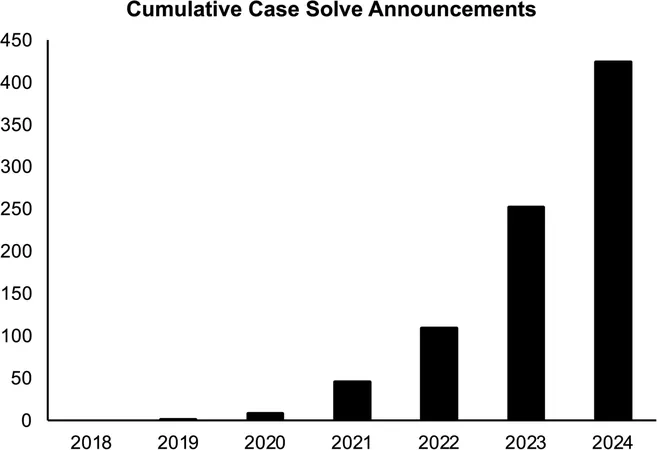
Revolutionizing Justice: How Genomics is Transforming Forensic Science
2025-09-22
Author: Jia
A Game-Changer in Forensics and Criminal Justice
For decades, the worlds of genomics and forensic science evolved separately—genomics propelled by groundbreaking projects like the Human Genome Project, while forensic science relied on traditional methods to establish identities using limited genetic markers. That shift is now here, marking a monumental merger between these two fields. Victims of crime can now receive the justice they deserve, while unidentified remains can finally be named.
The Power of SNP Testing
Enter Dense Single Nucleotide Polymorphism (SNP) testing—a revolutionary leap that opens the door to solving cold cases that have lingered for years, even decades. Unlike conventional STR profiling, which hinges on a mere handful of genetic markers, SNPs unleash the potential of hundreds of thousands, vastly enhancing the investigative toolkit. This technology excels in analyzing broken-down DNA samples, providing crucial leads where traditional STR typing falters.
STR methods typically focus on direct familial comparisons, mainly between parents and children, due to their limited scope. In contrast, the expansive data from SNP testing allows investigators to explore kinship beyond immediate family, revealing connections across multiple generations. This capability has proven invaluable in cases with unidentified suspects or remains.
Ancestry Insights and More
But SNPs do more than establish kinship—they also provide insights into an individual's ancestry. This means that in cases with no leads, profiling can direct law enforcement to communities linked to unidentified victims, enhancing outreach efforts. SNP-based ancestry analysis not only aids standard anthropological methods but dramatically sharpens the accuracy of investigative assumptions.
Furthermore, SNP testing supports forensic DNA phenotyping, projecting physical traits such as eye color and hair type that can lead investigators towards identifying suspects when other methods offer no clues.
Forensic Genetic Genealogy: The Catalyst for Change
The integration of Multi-Paralle Sequencing (MPS) into forensic science has received a powerful boost from Forensic Genetic Genealogy (FGG). By fusing DNA profiling with genealogical databases, FGG is revolutionizing the resolution of cold cases involving violent crimes and unidentified remains. Recent statistics from major providers of FGG services illustrate a sharp increase in solved cases, showcasing the urgent need for this innovative approach.
The Symbiosis of Genomics and Forensic Science
Addressing obstacles like degraded DNA—a common issue in forensic cases—has been a key focus. Ancient DNA research has developed advanced techniques that are now directly applicable to forensic samples. The work of pioneers like Svante Pääbo, awarded the Nobel Prize for his sequencing of the Neanderthal genome, plays a crucial role in transforming how we handle forensic evidence.
Expanding Opportunities for Justice
The fusion of genomics and forensic science creates numerous opportunities to enhance methodologies. Integrating advanced pipelines and frameworks established in genomics into forensic DNA analysis is essential for future success. As sequencing costs decline, the potential of Whole Genome Sequencing (WGS) becomes clearer, allowing profiles to be generated from even the most compromised samples.
Over half of the profiles in the existing CODIS database remain unidentified, prolonging the pain for victims and their families. FGG and WGS together can break these barriers, offering leads in cases that traditional STR methods cannot.
Automation and Scalability in Forensic Investigation
As we seek to resolve the staggering volume of unsolved violent crimes and unidentified remains, automation in genomic sequencing presents a viable solution. With the ability to rapidly analyze vast amounts of data, automated systems can provide consistent, objective results that enhance the forensic process. This technology promises not only efficiency but heightened accuracy and transparency in investigations.
The Promise of Forensic Genomics
In the belly of this technological beast lies the potential for significant societal impact. Each resolved case has ripple effects—restoring justice for survivors, honoring victims, and exonerating the wrongfully accused. The advancement of forensic genomics is not just a shift in techniques but a profound opportunity for healing within our communities. With hundreds of thousands of unresolved cases, it’s time to harness the power of genomics and ensure that no victim is left unnamed and no perpetrator escapes justice.



 Brasil (PT)
Brasil (PT)
 Canada (EN)
Canada (EN)
 Chile (ES)
Chile (ES)
 Česko (CS)
Česko (CS)
 대한민국 (KO)
대한민국 (KO)
 España (ES)
España (ES)
 France (FR)
France (FR)
 Hong Kong (EN)
Hong Kong (EN)
 Italia (IT)
Italia (IT)
 日本 (JA)
日本 (JA)
 Magyarország (HU)
Magyarország (HU)
 Norge (NO)
Norge (NO)
 Polska (PL)
Polska (PL)
 Schweiz (DE)
Schweiz (DE)
 Singapore (EN)
Singapore (EN)
 Sverige (SV)
Sverige (SV)
 Suomi (FI)
Suomi (FI)
 Türkiye (TR)
Türkiye (TR)
 الإمارات العربية المتحدة (AR)
الإمارات العربية المتحدة (AR)